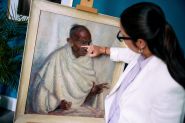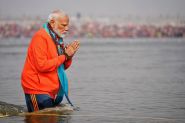
Zakir Hussain, a tabla legend, passed away at the age of 73 on December 15, 2024, in San Francisco. A visionary architect of world music, he graced the stage of the Beiteddine Festival in Lebanon twice—first in 1999 with Remember Shakti, and again in 2002 with Tabla Beat Science.
Zakir Hussain, the undisputed master of the tabla, made his mark in the history of music by building bridges between the East and the West. Born on March 9, 1951, in Mumbai into a family of musicians, he was the son of the renowned Alla Rakha and was destined for an exceptional career. A true child prodigy, he gave his first public concert at the age of seven, showcasing a prodigious talent that would only continue to flourish.
It was in 1970, upon moving to the United States, that Zakir Hussain began his meteoric rise on the international stage. Performing over 150 concerts annually, he captivated audiences around the world with his breathtaking virtuosity and magnetic charisma. His tabla playing, marked by astounding precision and speed, transcended borders and musical genres.
Hussain’s meeting with guitarist John McLaughlin in 1974 was a pivotal moment in his career. Together, they formed Shakti, a revolutionary group that blended jazz-rock and Indian music with an unprecedented harmony. This historic collaboration opened new horizons and inspired countless musicians worldwide. Shakti reunited in 1997 under the name Remember Shakti, continuing its visionary musical journey.
However, Zakir Hussain’s musical universe extended far beyond Shakti. He collaborated with internationally acclaimed artists on numerous prestigious projects. In 1991, alongside Mickey Hart, drummer of the Grateful Dead, he recorded the album Planet Drum, which revolutionized world music by bringing together percussionists from diverse cultures. This groundbreaking work won the first-ever Grammy Award in the World Music category, cementing Hussain’s genius.
His 1987 album Making Music, created with Jan Garbarek, John McLaughlin, and Hariprasad Chaurasia, remains his most-streamed opus, with over 34,000 listeners on digital platforms. Other notable collaborations in his discography include Music of the Deserts (1993), The Melody of Rhythm with Béla Fleck and Edgar Meyer (2009), and Good Hope with Dave Holland and Chris Potter (2019).
Beyond these ambitious projects, Zakir Hussain constantly explored new musical territories. He performed alongside luminaries such as Ravi Shankar, George Harrison, Van Morrison, Charles Lloyd, and Bill Laswell. His relentless pursuit of collaborations and challenges led him to perform with leading symphony orchestras and participate in numerous jazz and world music festivals.
His eclecticism and virtuosity earned him a host of prestigious accolades. Over the course of his career, Hussain received four Grammy Awards, including three in 2024 alone. India honored him three times with the Padma Shri (1988), Padma Bhushan (2002), and Padma Vibhushan (2023), recognizing his exceptional contributions to art and culture. In 1990, he was awarded the esteemed Sangeet Natak Akademi Prize.
Yet, it was on stage that Zakir Hussain’s genius truly shone. His fiery solos and dazzling improvisations transported audiences into a jubilant trance. His playing, characterized by an incredible range of tones and rhythms, combined earthy power with ethereal finesse. Each performance became a cathartic and transcendent experience, taking listeners to unimaginable musical realms.
Tributes pour in from around the globe. Everywhere he went, Hussain was welcomed as a veritable deity of music, adored by thousands of fans who held him in boundless admiration. His influence extended far beyond being a musician, elevating him to the status of a cultural and spiritual icon. His humility and generosity were matched only by his immense talent.
Teaching was also central to Zakir Hussain’s journey. He passionately shared his knowledge, preserving his family’s musical legacy. At his tabla school in Mumbai, a symbolic empty seat was kept in memory of his father, Alla Rakha. Through his example and pedagogy, Hussain helped the art of tabla flourish globally.
On the international stage, Zakir Hussain lit up the prestigious Beiteddine Festival in Lebanon twice. On July 28, 1999, he performed with John McLaughlin as part of the Remember Shakti project, offering the audience an unforgettable moment of musical grace. He returned on July 19, 2002, with Tabla Beat Science, bringing together luminaries like Bill Laswell, Ustad Sultan Khan, Karsh Kale, and DJ Disk for an electrifying performance blending world music and electronic sounds.
In a career spanning over 50 years, Zakir Hussain revolutionized the art of tabla and Indian music, giving it a universal dimension. His open-mindedness, insatiable curiosity, and musical brilliance made him an unparalleled cultural ambassador—a bridge between East and West, tradition and modernity. Zakir Hussain leaves behind an indelible legacy as an extraordinary musician and a luminous soul who dedicated his life to music and fostering unity. among people.




Comments